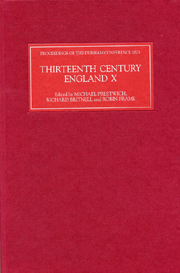Book contents
- Frontmatter
- Contents
- PREFACE
- ABBREVIATIONS
- The Meetings of Kings Henry III and Louis IX
- Counting the Cost: The Financial Implications of the Loss of Normandy
- Networks of Markets and Networks of Patronage in Thirteenth-Century England
- Three Alien Royal Stewards in Thirteenth-Century England: The Careers and Legacy of Mathias Bezill, Imbert Pugeys and Peter de Champvent
- The Eyre de terris datis, 1267–1272
- Joan, Wife of Llywelyn the Great
- Town and Crown: The Kings of England and their City of Dublin
- English Landholding in Ireland
- The Reception of the Matter of Britain in Thirteenth-Century England: A Study of Some Anglo-Norman Manuscripts of Wace's Roman de Brut
- Fearing God, Honouring the King: The Episcopate of Robert de Chaury, Bishop of Carlisle, 1258–1278
- Cloistered Women and Male Authority: Power and Authority in Yorkshire Nunneries in the Later Middle Ages
- Taxation and Settlement in Medieval Devon
- Clipstone Peel: Fortification and Politics from Bannockburn to the Treaty of Leake, 1314–1318
- Royal Patronage and Political Allegiance: The Household Knights of Edward II, 1314–1321
- ‘Edward II’ in Italy: English and Welsh Political Exiles and Fugitives in Continental Europe, 1322–1364
Counting the Cost: The Financial Implications of the Loss of Normandy
Published online by Cambridge University Press: 12 September 2012
- Frontmatter
- Contents
- PREFACE
- ABBREVIATIONS
- The Meetings of Kings Henry III and Louis IX
- Counting the Cost: The Financial Implications of the Loss of Normandy
- Networks of Markets and Networks of Patronage in Thirteenth-Century England
- Three Alien Royal Stewards in Thirteenth-Century England: The Careers and Legacy of Mathias Bezill, Imbert Pugeys and Peter de Champvent
- The Eyre de terris datis, 1267–1272
- Joan, Wife of Llywelyn the Great
- Town and Crown: The Kings of England and their City of Dublin
- English Landholding in Ireland
- The Reception of the Matter of Britain in Thirteenth-Century England: A Study of Some Anglo-Norman Manuscripts of Wace's Roman de Brut
- Fearing God, Honouring the King: The Episcopate of Robert de Chaury, Bishop of Carlisle, 1258–1278
- Cloistered Women and Male Authority: Power and Authority in Yorkshire Nunneries in the Later Middle Ages
- Taxation and Settlement in Medieval Devon
- Clipstone Peel: Fortification and Politics from Bannockburn to the Treaty of Leake, 1314–1318
- Royal Patronage and Political Allegiance: The Household Knights of Edward II, 1314–1321
- ‘Edward II’ in Italy: English and Welsh Political Exiles and Fugitives in Continental Europe, 1322–1364
Summary
The loss of Normandy in 1204 should rightly be considered one of the most important events in British history, mainly because King John's unprecedented financial activity in the subsequent decade was the main reason behind the political dissent that culminated in the formulation of Magna Carta. The charter's financial significance cannot be overstated, as the restrictions it imposed on the crown's ability to raise revenue shaped the political landscape for the remainder of the thirteenth century. Both major crises of the thirteenth century, namely the baronial reform movement from 1258 to 1265, and the opposition to Edward I from 1297, share the same underlying factor – the crown's desperate need for money caused by the impositions of 1215. Therefore fully to comprehend why momentous political events occurred in the way they did, it is imperative to grasp the financial circumstances that lie behind them.
In consequence, this paper provides an overview of English state finance from 1190 to 1307 in relation to the causes and implications of the loss of Normandy. There are two primary areas of focus. First, by using recent surveys of the Angevin financial administration, it is possible to reassess John's role in the collapse of the Anglo-Norman realm. The somewhat surprising conclusions of this initial survey make it possible to demonstrate that the impact of the disaster on the constituent elements of royal revenue, as well as the mechanics of the financial administration, was still relevant at the end of Edward's reign over a century later.
- Type
- Chapter
- Information
- Thirteenth Century England XProceedings of the Durham Conference, 2003, pp. 31 - 40Publisher: Boydell & BrewerPrint publication year: 2005



